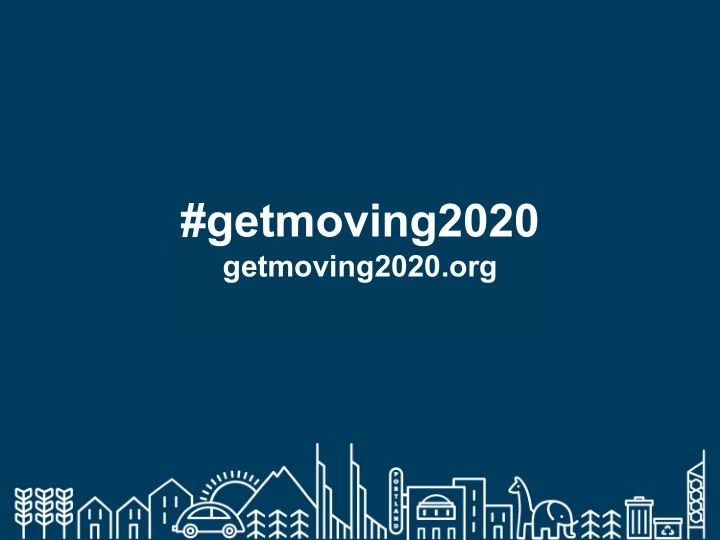

#getmoving2020 getmoving2020.org
Task Force agenda: Jan. 15, 2020 Public comment Council report Timeline update Revenue options feasibility Discussion & feedback to Council Next steps 2 Photo: PBOT
Up to 30 minutes is available for verbal public comment, from up to 15 speakers. If more than 15 people have signed up, a lottery will identify speakers. Verbal comments will be limited to 1 minute 45 seconds. Please submit written comments at getmoving@ oregonmetro.gov Comments submitted by 2 p.m. on the day of a Task Force meeting will be printed for that meeting’s packet.
Metro Council update Public hearing: 47 people testified Work sessions, 1/7 & 1/14: Council direction on Tier 1 corridors 4
Task Force timeline update Today: Mid-late March 4 April 1 Late May: January February March April May Revenue February: meeting: meeting: Council feedback to Program Tier 2 Programs referral Council community recommend- Staff decision workshops ation, Recommen- Jan. 28: Programs dation; Council work Feb. 19 update Oversight session: 1/28 meeting: Tier 2 March 18 April 15 corridor meeting: meeting : discussion Oversight Refinement discussion, discussion; Expenditure Last Plan meeting! DRAFT – Subject to change 5
Programs engagement February workshops Community partners & stakeholders: Focused conversations Online component April: Staff recommendation & Council direction 6
Recap: 12/11 Revenue presentation Transportation funding in the region: Where does regional measure fit? Revenue options findings: Feasibility, public support 7
Pieces of the funding puzzle State & Transit Federal Local Regional 8
What do we need to raise? Corridors Task Force Recommendations Leveraged FTA & Local Total Tier 1 Tier 1 Measure investments Investments Corridor Investments $3.81B $2.22B $6.03B Programs $1B $50 million/year for 20 years Total Investments $7.03B Total revenue stream needed $350-$450 million annually for 20 years DRAFT – 1/15/2020 – Subject to change 9
Recap: Is an option feasible? Can Metro use it? Can it be collected easily? Does it help raise enough? Could voters and key stakeholders support it? 10
Staff analysis: Feasibility More feasible options: Employer payroll tax • Vehicle registration fee • Business income tax • Personal income tax • Not recommended: Property tax Not feasible at this time: Sales tax • Regional gas tax • Vehicle privilege tax • 11 Corporate activity tax •
Possible combinations for raising sufficient revenue Tested in public opinion research, Dec. 2019 Strongest support Vehicle registration fee ($50) + Personal income tax (1% of income over $100,000) + Employer payroll tax (0.6%) Vehicle registration fee ($50) Business income tax (1%) Weak support Vehicle registration fee ($50) + Property tax (40 cents/$1000 assessed value) + Employer payroll tax (0.6%) 12
Discussion What are your reactions to these possible mechanisms or combinations? What values or outcomes are most important to you? Is there anything you think should come off the table? Why or why not? 13
Next steps: Highlights Jan. 28 Metro Council work session Revenue options direction Mid/late Feb. Program workshops – Details TBA Feb. 18 Metro Council work session Feb. 19 Task Force meeting Tier 2 corridor discussion, Outcomes updates March 4 Task Force meeting Tier 2 corridor investment recommendations March 17 Metro Council work session Tier 2 corridor investment direction March 18 Task Force meeting Expenditure plan, Oversight discussion 14 Photo: Trimet
#getmoving2020 getmoving2020.org
Recommend
More recommend